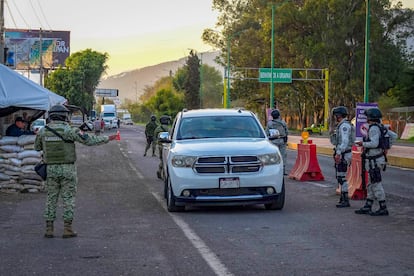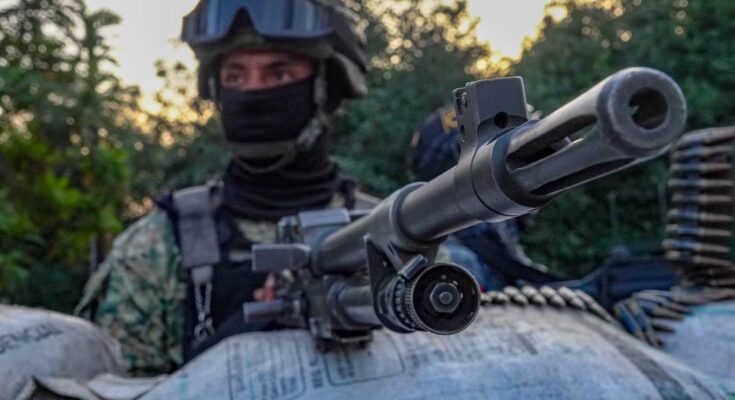As of this Sunday, Michoacán has its fourth pacification plan in 19 years. Claudia Sheinbaum announced on Sunday afternoon her commitment to putting out a fire that has raged and calmed down for decades, but whose flames have touched presidents of all parties and all ideologies. The president presents her initiative forced by reality, which has hit hard her optimistic figures on the reduction of homicides after the murders of the mayor of Uruapan, Carlos Manzo, and the leader of the lemons Bernardo Bravo. Omar García Harfuch, Minister of Security, defined the pacification of Michoacán as “a national priority”.
The Executive showcased a strong collective message launched by the Council of Ministers from the National Palace. The event was attended by almost all Secretaries of State, who announced around a hundred measures ranging from increasing the military presence in the region, new strategies to combat extortion of farmers, to the expansion of student scholarships and social support, to investments in public roads and fences.
Sheinbaum assured that his plan includes a public-private investment of approximately 57 billion pesos (3 billion dollars), of which almost 26 billion will be allocated to road infrastructure. The president reported that next year her government will allocate 37 billion pesos (2 billion dollars) in social programs that will benefit 1.5 million inhabitants of the state, which has a population of almost five million.
“We will apply even more republican austerity to allocate everything to the Mexican people. A special effort is being made for the people of Michoacán,” the president said. Sheinbaum said he will personally monitor the plan every two weeks and report on progress monthly at his morning news conference.
The government’s announcement comes amid a wave of social indignation caused by the murder of Manzo, an independent politician who had decided to take charge of the insecurity problems in his municipality with his own hands. He was silenced by a 17-year-old hitman allegedly linked to the Jalisco New Generation (CJNG) cartel in a state that already had more than 4,600 soldiers assigned to security duties.
The crime sparked massive protests calling for the resignation of Morensita governor Alfredo Ramírez Bedolla. Manzo’s widow, Grecia Quiroz, who replaced her late husband, warned at a crowded rally Friday: “In 2027 we will give them that vote of punishment because we will make their memory count.”
Bedolla dedicated some moments of his speech to the moment of effervescence that is being experienced in Michoacán. “The protests are a legitimate cry of pain and a starting point,” said the governor, who has experienced firsthand the cyclical violence of the state he governs. “Almost 40 years ago, right in Uruapan, my father, a lawyer by profession and a rancher, was murdered. I understand the imprint of violence more than you think. Carlos’ murder brought me back to my past. It is not anger that calms the soul, it is learning to honor in life those who are no longer with us today,” said the president, who brought some humanity to an event where officials marched citing figures and projects.

On Tuesday, Sheinbaum advanced the three pillars on which his plan rests: Security and Justice; Economic Development and Education and Culture for peace. The president assured that her cabinet officials have started a round of consultations this week with various actors of the entity to develop the initiative. “Peace is not imposed by force, it is built with people, with communities and with daily work,” Sheinbaum said in his press conference.
The proposals that make up Sheinbaum’s initiative arose from a series of discussions organized by the state government. Over four days, mayors, entrepreneurs, farmers, education specialists and members of the Catholic Church were heard. In these exercises, the opinions of kuarichascommunity security groups formed by the Purépecha indigenous people. These self-government formations, which have their most successful example in the community of Cherán, are a reference for the president of Mexico.
However, the first thing his government strengthened after the high-profile killings was the armed presence of security forces. About 400 National Guard members arrived in Uruapan on Wednesday. The deployment complemented what the Ministry of Defense has recently carried out in other parts of the entity, such as Tepalcatepec, where in recent weeks there have been clashes between the military and groups allegedly linked to the CJNG.
The mobilization serves as an advance for the elements that will arrive in the next few hours. “The state of strength has increased,” Harfuch said. General Ricardo Trevilla, defense secretary, said 1,980 soldiers will arrive this week to reinforce patrols and security duties. Furthermore, another 4,000 elements will work to prevent organized crime groups from “entering or exiting Michoacán”, increasing surveillance on the borders with the State of Mexico, Jalisco and Colima. There will be a total of 10,500 soldiers that will be present in the entity.
García Harfuch, who will visit the state this week together with General Trevilla, also announced a strengthening of the anti-extortion program. It will have an anonymous reporting line with operators particularly focused on Michoacán. Additionally, there will be 860 soldiers dedicated to responding to complaints about avocado trees and another 820 dedicated to lemons.



